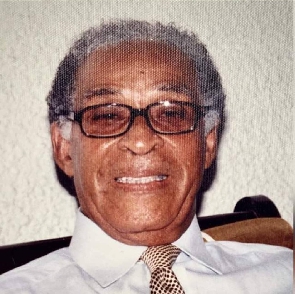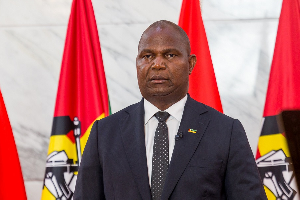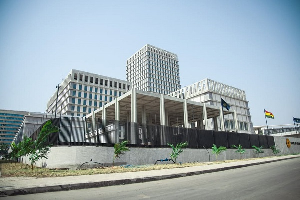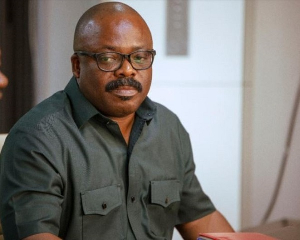At 100 years, Smyly Cleland Amu Chinery can be said to have seen, heard and arguably, done it all.
Born on March 12, 1923, the life of the man touted to be the first District Commissioner (District Chief Executive) in the Northern Region of Ghana, is one that should surely be an inspiration.
From the highs and the lows, to the good, the great and the bad, at 100, it is not surprising that his family is celebrating him for all that he has accomplished as a patriarch and in his career, even though he went on retirement in 1978.
He may have had a decent career but did not mean he did not achieve great things. For instance, there was a momentous occasion, during the visit of Osagyefo Dr Kwame Nkrumah to the then newly-created Upper Region, Smyly was privileged to write the speech the president read.
That, however is only one of the few things he was well-known for.
So, what more is there about the story of this illustrious senior citizen of Ghana?
Below is a profile on the man known as Smyly Cleland Amu Chinery:
Early Childhood
Smyly Chinery was born on March 12th 1923, to Cecil Cleland Chinery and Mrs Kate Chinery (née Kotey).
His early childhood was spent in his grandfather's home, Arthur Robert Nii Armah Twetewgu Chinery and his grandmother Mrs Virginia Chinery. Spending the more significant part of his childhood under the care of his grandparents, who were loving but strict, significantly contributed to the moulding of the man that Smyly would become later in life.
Education
His primary School education started at the St. Mary's (Anglican) Elementary School in Accra. He subsequently went on to attend The Bishop Boy's School in Accra.
Smyly was an Altar Boy at the Holy Trinity Cathedral Accra and sang in the Church choir during his days at the Bishop Boys School and his early days at Adisadel College.
He attended Adisadel College from I939 to 1944 and was the Head prefect of the School from 1943 to 1944.
He blazed the trail at Adisadel college for the Chinery family. Following close behind him was his brother David Ofei Chinery and, in later years, his sons: Roger Dodu Chinery, the late Cecil Claude Nii Addy Chinery, and Thomas Darku Chinery.
Also numbered in this 'Adisco family tradition' roll call are his cousins Lebrecht James Nii Tettey Chinery-Hesse, Arthur Papa Nii Chinery-Hesse, Emlyn Baby Kwashie Chinery Hesse, Frederick Guggisberg "Bey" Chinery, James Kwesi Ampo Chinery, Aristides "Tides" Hammond (Sukutu), Patrick Appiahsam Hammond "Tormentor". Some of these cousins have, sadly, predeceased him. His nephew Oko Chinery Hesse continued the tradition and is an old boy of Adisco.
After leaving Adisadel college, he worked at the Ministry of Agriculture from 1944 to 1946.
He attended Achimota School from 1946 to 1948 for intermediary studies, thus paving the way to pursuing a University education in the United Kingdom.
In 1948 he earned a British Government Scholarship to study at The University of Glasgow in Scotland to read Classics (Latin, Greek) and Chemistry and, later on, Economics, from which he graduated with a Master's Degree in 1952. He returned to the then-Gold Coast the same year and started his career in the Civil service of the then-Gold Coast.
Family life
On December 18th 1954, he married a childhood friend Vera Constancia Awaya Whitaker, who sadly predeceased him in September 2011.
They were blessed with five children: Ofei Djoleto (1946- 2016), a daughter, Alexandra Naa Abia (1955); Roger Dodu (1956); Cecil Claude Nii Addy (1958-2000); Thomas Darku (1959). In addition, he has been blessed with 11 grandchildren and 14 great-grandchildren.
Civil Service career
He started his Gold Coast civil service career at the Ministry of Finance, Accra, in 1952 as an Administrative Officer.
After two years at the Ministry of Finance, he was posted to the Northern Territories of Ghana as District Administrative Officer/District Commissioner.
His first posting was to the District of Zuarungu, later serving in the same role in various towns and districts, including Bawku, Gambaga, Navrongo, Salaga and Wa. He served in these Districts from 1954 to 1958.
In that role, he and his contemporaries also performed the duties of Magistrates. They occasionally had the unpleasant task of sentencing Chiefs and some leaders of minor political factions to overnight incarceration in jail to keep the peace in these districts.
There was a lot of political strife, occasionally leading to violent clashes in these Districts. Some of these tough decisions had to be made at the risk of personal retaliation from some of the factions whose leaders had had to be temporarily restrained by placing them in short-term custody.
He was posted to Tamale in 1958, where he was assigned to the Regional Office and served as Regional Administrative Officer/secretary to the Regional Commissioner.
Two Years later, in 1960, when Ghana became a republic and the Upper Region was carved out as a new Region from the then Northern Territory, he was posted to Bolgatanga, which became the Regional Capital for the newly carved out Region.
He served under the Region's first Regional Commissioner, Mr Ayeebo Asumda. Then, the new Region began to experience a growth spurt due to President Kwame Nkrumah's vision of self-sufficiency and industrialisation.
Included in these projects was the building of roads, bridges and other infrastructure. Some of these were: the Original Pwalugu Bridge, The Tomato canning factory at Pwalugu, and the meat processing and canning factory at Zuarungu (Volta Corned Beef), to name a few.

As Regional Administrative Officer, he wrote several speeches for the Regional Minister. On one occasion, he earned the privilege of being asked to write the speech to be delivered by the President, Dr Kwame Nkrumah, on one of his many visits to the newly-created Region.
These were busy but exciting times for all in the Upper Region. But, unfortunately, these exciting times were marred by the assassination attempt on Kwame Nkrumah's life at Kulungugu, a small village in the Bawku District, on August 11th 1962.
His tenure as the first Regional Administrative Officer for the Upper Region ended in 1964 when a call for his transfer to Accra was made.
He was posted to the Establishment Secretariat as Principal Assistant Secretary from 1964 to 1966.
After the 1966 coup, he was again transferred to Tamale and promoted to Principal Secretary. After that, he assumed the position of Regional Administrative Officer and a member of the three-person Regional Committee of Administration, a role he held until 1969 when he was again transferred to Accra.
Overall, Smyly spent half of his 26-year career in the service of his country in the Northern and Upper Regions of Ghana, a time in his career that he truly cherished. Indeed, reminiscences of these times still make Smyly smile (no pun intended). During his work and visits to small towns and villages where he executed his duties, he communicated with the local folk in their regional dialects. As a result, he could carry on reasonably decent conversations in, Kusasi, Frafra and Dagbani.
From 1969 to 1973, he served as Principal Secretary in the following Ministries in Accra: Rural Development, Office of Government Machinery, Office of the President and Finally, the Ministry of Defense.
During that period, he also spent a while on secondment to the Ford Foundation.
He took French language lessons at the Alliance Française in Accra and became proficient in conversational French.
In 1973, he was promoted to Deputy Secretary to the Cabinet assigned to the Special Services Division, a position he held until he retired from the civil service in 1978.
Upon his retirement, Smyly was honoured with the National Award, Member of The Order of The Volta (Civil Division).
Not one for being idle, he engaged in several consultancy assignments after retiring from the Ghana Civil Service. Subsequently, he tried his hand at Rice Farming in Northern Ghana and engaged in a small fishing business.
Later, he set up a Secretarial Services Business, which he closed after the passing of his son Cecil in the year 2000.
Smyly has spent the rest of his retirement years visiting his children, grandchildren, siblings, nephews and nieces all over the globe (London, Middlesborough, Toronto, Mississauga, Los Angeles, etc.).
He was Head of The Chinery Family for over 20 Years. An excellent, calm, collected, good-humoured, and level-headed leader, Smyly has been a true inspiration and blessing to the extended family.
AE/WA
General News of Friday, 10 March 2023
Source: www.ghanaweb.com













